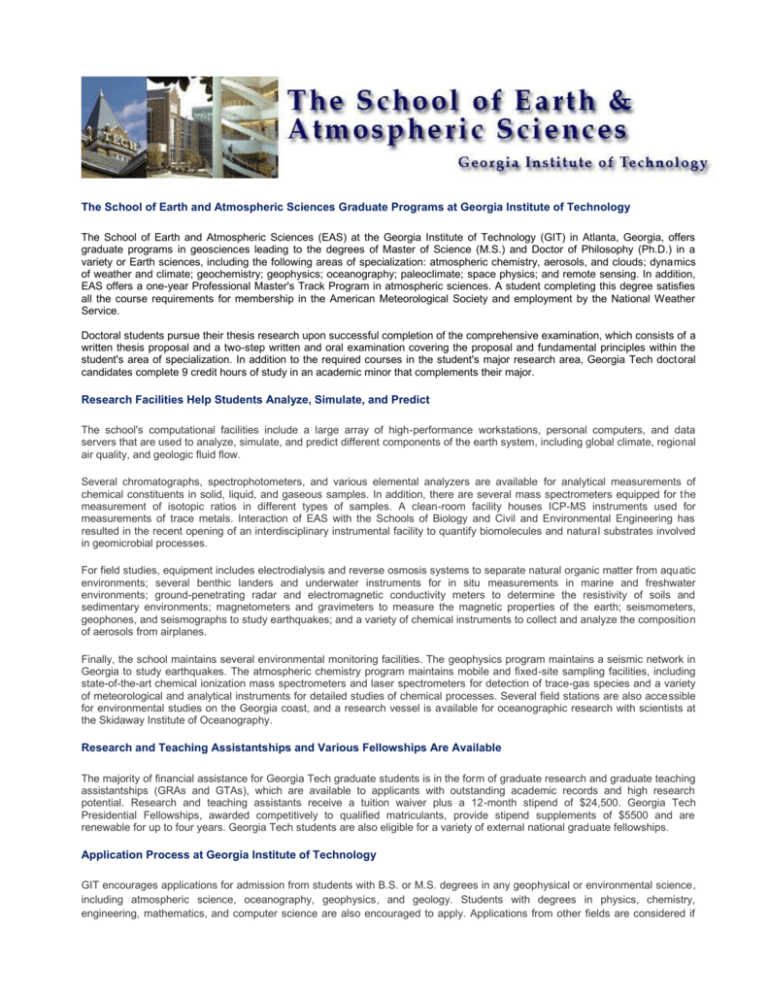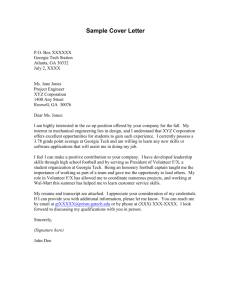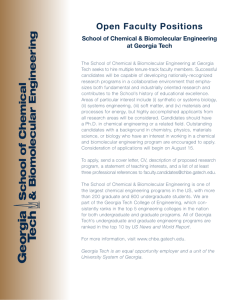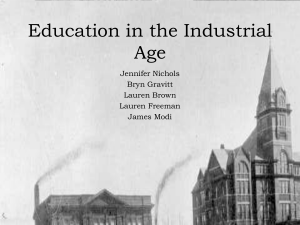eas_overview_2012
advertisement

The School of Earth and Atmospheric Sciences Graduate Programs at Georgia Institute of Technology The School of Earth and Atmospheric Sciences (EAS) at the Georgia Institute of Technology (GIT) in Atlanta, Georgia, offers graduate programs in geosciences leading to the degrees of Master of Science (M.S.) and Doctor of Philosophy (Ph.D.) in a variety or Earth sciences, including the following areas of specialization: atmospheric chemistry, aerosols, and clouds; dynamics of weather and climate; geochemistry; geophysics; oceanography; paleoclimate; space physics; and remote sensing. In addition, EAS offers a one-year Professional Master's Track Program in atmospheric sciences. A student completing this degree satisfies all the course requirements for membership in the American Meteorological Society and employment by the National Weather Service. Doctoral students pursue their thesis research upon successful completion of the comprehensive examination, which consists of a written thesis proposal and a two-step written and oral examination covering the proposal and fundamental principles within the student's area of specialization. In addition to the required courses in the student's major research area, Georgia Tech doct oral candidates complete 9 credit hours of study in an academic minor that complements their major. Research Facilities Help Students Analyze, Simulate, and Predict The school's computational facilities include a large array of high-performance workstations, personal computers, and data servers that are used to analyze, simulate, and predict different components of the earth system, including global climate, regional air quality, and geologic fluid flow. Several chromatographs, spectrophotometers, and various elemental analyzers are available for analytical measurements of chemical constituents in solid, liquid, and gaseous samples. In addition, there are several mass spectrometers equipped for the measurement of isotopic ratios in different types of samples. A clean-room facility houses ICP-MS instruments used for measurements of trace metals. Interaction of EAS with the Schools of Biology and Civil and Environmental Engineering has resulted in the recent opening of an interdisciplinary instrumental facility to quantify biomolecules and natural substrates involved in geomicrobial processes. For field studies, equipment includes electrodialysis and reverse osmosis systems to separate natural organic matter from aquatic environments; several benthic landers and underwater instruments for in situ measurements in marine and freshwater environments; ground-penetrating radar and electromagnetic conductivity meters to determine the resistivity of soils and sedimentary environments; magnetometers and gravimeters to measure the magnetic properties of the earth; seismometers, geophones, and seismographs to study earthquakes; and a variety of chemical instruments to collect and analyze the composition of aerosols from airplanes. Finally, the school maintains several environmental monitoring facilities. The geophysics program maintains a seismic network in Georgia to study earthquakes. The atmospheric chemistry program maintains mobile and fixed-site sampling facilities, including state-of-the-art chemical ionization mass spectrometers and laser spectrometers for detection of trace-gas species and a variety of meteorological and analytical instruments for detailed studies of chemical processes. Several field stations are also accessible for environmental studies on the Georgia coast, and a research vessel is available for oceanographic research with scientists at the Skidaway Institute of Oceanography. Research and Teaching Assistantships and Various Fellowships Are Available The majority of financial assistance for Georgia Tech graduate students is in the form of graduate research and graduate teaching assistantships (GRAs and GTAs), which are available to applicants with outstanding academic records and high research potential. Research and teaching assistants receive a tuition waiver plus a 12-month stipend of $24,500. Georgia Tech Presidential Fellowships, awarded competitively to qualified matriculants, provide stipend supplements of $5500 and are renewable for up to four years. Georgia Tech students are also eligible for a variety of external national graduate fellowships. Application Process at Georgia Institute of Technology GIT encourages applications for admission from students with B.S. or M.S. degrees in any geophysical or environmental science, including atmospheric science, oceanography, geophysics, and geology. Students with degrees in physics, chemistry, engineering, mathematics, and computer science are also encouraged to apply. Applications from other fields are considered if the program of study taken includes three semesters of calculus-based mathematics, two semesters of calculus-based physics, and two semesters of chemistry. Georgia Tech recommends applications materials be submitted no later than January 15. Application information is available from the EAS Graduate Admissions Committee and prospective applicants are encouraged to directly contact faculty members with whom their research interests best coincide. Admission decisions are based on a collective consideration of academic transcripts, Graduate Record Examination (GRE) scores, letters of recommendation, and personal statement. For international students whose native language is not English, the Test of English as a Foreign Language (TOEFL) is required. Georgia Tech's Institute Code for GRE registration is R5248. Georgia Tech's Institute Code for TOEFL registration is 5248GT. Entrance Requirements: For master's and doctorate, GRE, academic transcripts, letters of recommendation, personal statement. Additional exam requirements/recommendations for international students: Required–TOEFL (minimum score 550 paper-based; 213 computer-based; 79 iBT). Application Deadline: For fall admission, 1/15 for domestic and international students. Applications are processed on a rolling basis. Application fee is $50. Student Statistics: 143 applicants, 18% accepted, 15 enrolled. Student Population: 85 (36 women). Financial Aid: In 2009–10, 3 fellowships, 54 research assistantships were awarded; 33 teaching assistantships (averaging $23,500 for 12-month stipend plus tuition waiver), 10 Presidential Fellowships also available. Financial award application deadline: Programs Offered: Offers atmospheric chemistry, aerosols and clouds (MS, PhD); dynamics of weather and climate (MS, PhD); geochemistry (MS, PhD); geophysics (MS, PhD); oceanography (MS, PhD); paleoclimate (MS, PhD); planetary science (MS, PhD); remote sensing (MS, PhD). Degree Requirements: For master's, thesis or alternative; for doctorate, comprehensive exam, thesis/dissertation. Degree Program Information: Part-time programs available. Faculty Research: Geophysics; atmospheric chemistry, aerosols and clouds; dynamics of weather and climate; geochemistry; oceanography; paleoclimate; planetary science; remote sensing. Total Annual Research Expenditures: $5 million. Contact Info EAS Graduate Admissions Committee Phone: 404-894-3893 Fax: 404-894-5638 www.eas.gatech.edu EAS Georgia Tech





